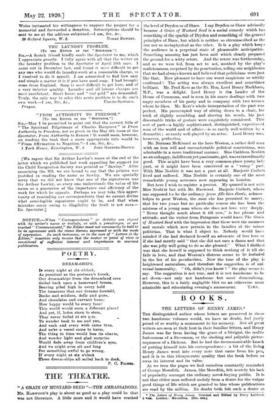THE THEATRE.
" A GRAIN OF M1JSTARD SEED "—THE AMBASSADORS. Ma. 1lAnwoon's play is about as good as a play could be that was not literature. A little more and it would have reached the level of Dryden or of Shaw. I say Dryden or Shaw advisedly because A Grain of Mustard Seed is a social comedy which has something df the sparkle of Dryden and something of the.general principles of Shaw, but which is neither so eireumscribed as the one nor so metaphysical as the other. It is a play which keeps the audience in a perpetual state of pleasurably anticipation.
Something amusing has just been said which clearly prepared the ground for a witty retort. And the retort was forthcoming,
and so we were led, from act to act, soothed by the play's maliciousness, surprised by its penetration, telling our neighbours that we had always known and believed that politicians were just
like that. How pleasant to have our worst suspicions so 'wittily confirmed The acting was always exoellent and sometimes
brilliant. Mr. Fred Kerr as the Rt. Hon. Lord Henry Markham, ➢ LP., was a delight. Lord Henry is the Leader of the House of Commons, and is seen in his suave dealings with two angry members of his party and in company with two women whom he likes. Mr. Kerr's whole interpretation of the part was perfect. His preoccupied way of sitting down in a chair, his trick of slightly mumbling and slurring his words, his just discernable tricks of gesture wore exquisitely considered. This sort of part—a highly sophisticated, distinguished, experienced
man of 'the world and of affairs—is so rarely well-written by a dramatist ; so rarely well played by an actor. Lord Henry was, however, perfection.
Mr. Norman McKinnel as the hero Weston, a rather dull man with an iron will and uncomfortable political convictions, was admirable in a more traditional manner. Miss Cathleen Nesbitt as an unhappy, indifferent yet passionate, girl, was extraordinarily good. This might have been a very common-place young lady part, or it might have been conceived as a " vamp " part. With Miss Nesbitt it was not a part at all. Marjorie Corbett lived and suffered. Miss Nesbitt is certainly one of the most remarkable young actresses now appearing in London.
But here I wish to register a protest. My quarrel is not with Miss Nesbitt but with Mr. Harwood. Marjorie Corbett, whom one supposed t o be the ordinary jeune file Lien Renee, aoknow-
ledges to poor Weston, the. man she has promised to marry, that for two years but no particular reason she has been the mistress of a young man whom she does. not love very deeply.
" Never thought much about it till now," is her phrase and attitude, and the visitor from Patagonia would leave The Grain of Mustard Seed with the impression that these were the manners
and morals which now pertain in the families of the minor politician. That is what I object to. Nobody would have
minded if she had declared herself an advocate of free love or if she had merely said " that she did not rare a damn and that she was jolly well going to do as she pleased." What I disliked was that she herself is =supposed to think nothing of it till she
falls in love, and that Weston's distress seems to be inoluded in the list of his peculiarities. Now the tone of the play is heightened naturalism, and therefore 'the suggestion is of uni- versal immorality. " Oh, didn't you know ? " the play seems to say. The suggestion is not true, and it is not handsome to be set down—not only not handsome • but most demoralising. However, this is a fairly negligible blot on an otherwise most
admirable and stimulating evening's amusement. TARN.


































 Previous page
Previous page